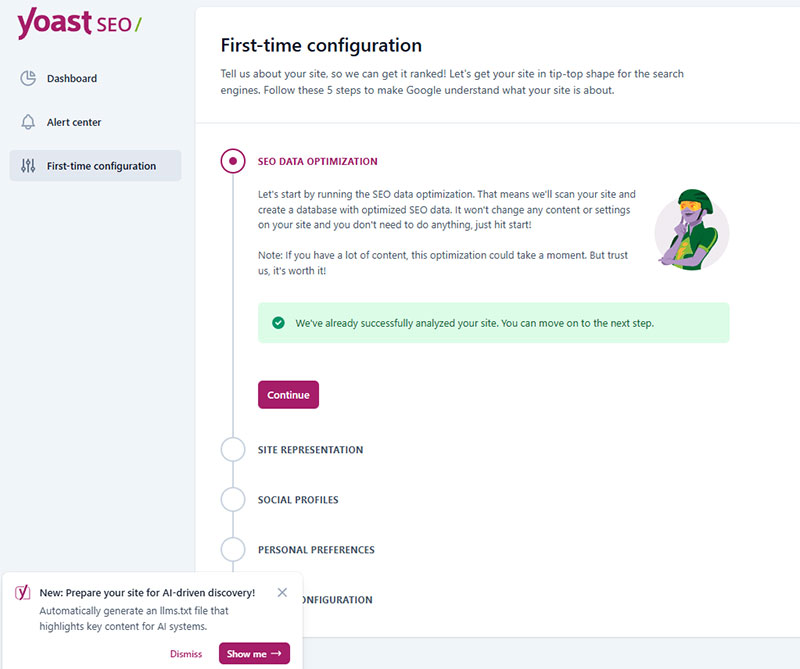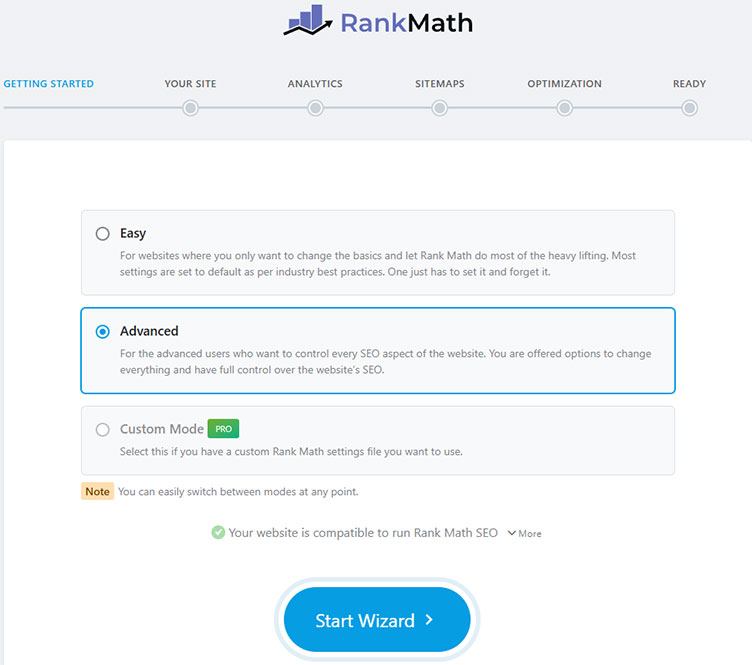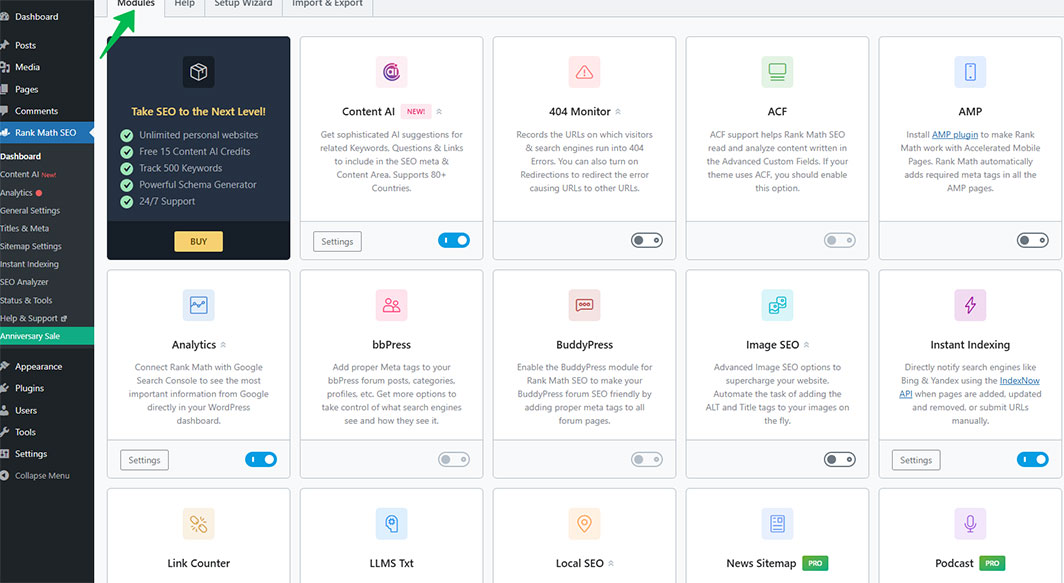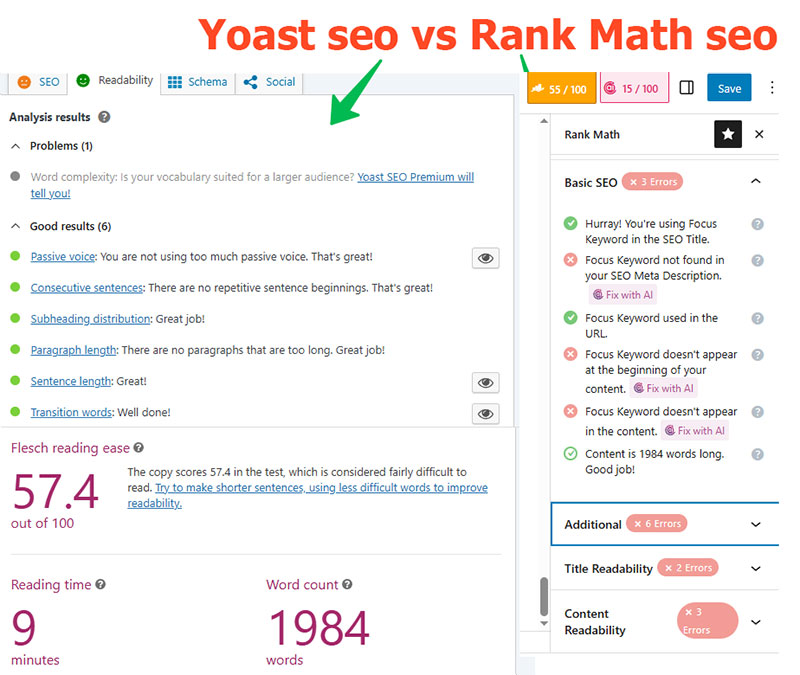To be perfectly honest, deciding between Rank Math and Yoast SEO can feel a little bit like picking between two nearly identical, high-performance sports cars. Both will get you to the same destination—better search rankings—but the driving experience, the features under the hood, and the price tag are definitely different. As someone who’s worked deep in the WordPress ecosystem for years, I’ve had both of these powerful plugins on my sites and on client sites, and I’ve seen firsthand where one truly excels and the other falls short.
If you’re like most website owners, you’re looking for straight answers and zero fluff. You don’t want a simple feature list; you want to know which one is the smarter long-term investment for your SEO strategy. That’s exactly why I put this comparison together. I’ve gone beyond the “green light” scoring systems and dug into the core technical aspects that actually move the needle, like structured data (micro-markup), site speed impact, and redirect management.
This isn’t just another comparison; it’s a detailed, hands-on guide. By the end of this article, you’ll have a crystal-clear understanding of the pros, cons, and hidden costs of both options. When you finish reading, you will know definitively which plugin is the true leader in the Rank Math vs Yoast debate and which one deserves a permanent spot on your WordPress install. Let’s dive in.
At a Glance
Yoast SEO: The Established Veteran. Yoast SEO has been the undisputed champion of WordPress SEO for over a decade. Founded by Joost de Valk, it set the industry standard for on-page content analysis with its famous traffic-light scoring system. It’s well-known for its excellent readability features, which truly help beginner writers structure their content better. When you choose Yoast, you’re choosing the established option with a massive, time-tested knowledge base. However, many advanced features like redirect management are only available through separate, paid add-ons, which can dramatically increase the overall cost.

Rank Math: The Feature-Rich Challenger. Launched more recently, Rank Math entered the scene determined to disrupt the status quo by offering a huge array of advanced features for free, many of which are locked behind Yoast’s premium paywall. It provides comprehensive technical SEO capabilities, including multiple schema types and built-in 404 monitoring. The setup wizard is notably smooth, appealing to developers and power users who want maximum functionality without needing a half a dozen additional plugins. Rank Math’s main drawback, historically, has been its shorter track record compared to the long history of Yoast.

The Quick Breakdown
Before diving into the nitty-gritty of individual features, here is a quick, side-by-side summary of the core differences between the two plugins. This will give you an immediate idea of which feature set aligns better with your site’s needs.
| Feature | Yoast SEO | Rank Math |
| Free Version Features | Basic features (SEO title, 1 focus keyword, basic Schema, Readability). | Extensive features (Multiple focus keywords, 18 Schema types, Redirects, 404 Monitor, Image SEO). |
| User Interface (UI) | Time-tested, clear traffic-light system. Separate sidebar and classic meta box. | Modern, streamlined design. Fully integrated into the Gutenberg sidebar. |
| Content Analysis | Excellent focus on Readability (Flesch Score) and grammar checks. | Score-based (out of 100), better for overall SEO scoring, but less detailed readability advice. |
| Schema Markup | Basic types in Free, advanced types require paid add-ons. | Extensive pre-defined types (18+) available in the Free version. |
| Redirect Manager | Premium add-on only. | Free and built-in (including automatic redirect creation). |
| 404 Monitoring | Not included. | Free and built-in. |
| E-E-A-T Support | Primarily through Author Archives (Premium). | Better integration of Author Schema and Local SEO data (Free). |
| Pricing Model | Higher starting price for Premium, many features sold as costly separate add-ons. | Lower entry price for Pro, includes unlimited personal sites. All major features in one package. |
Feature Comparison: Free vs Pro
When comparing the core experience, the Rank Math free vs Yoast free debate isn’t much of a contest. Yoast’s free offering is the perfect entry point for a brand-new blogger who just needs to set a title and a meta description, and maybe get some simple feedback on their writing style. However, Rank Math comes loaded with features that are essential for serious growth but are conspicuously absent in Yoast’s free tier. We are talking about the Redirect Manager, the 404 Monitor, and the ability to optimize your content for multiple focus keywords. For any user aiming for competitive SEO, Rank Math’s free toolkit simply offers far more utility.
Okay, but what happens once you decide to pay? When we start assessing the value you get from Rank Math Pro vs Yoast SEO, things get really interesting. Yoast SEO Premium provides internal linking suggestions and multiple focus keyword support, but its biggest issue is its fragmentation. If you want essential technical features like Local SEO, Video SEO, or News SEO, you have to purchase separate add-ons, turning the annual cost into a four-figure expense quickly. Rank Math Pro, on the other hand, packs everything into a single, cohesive, and relatively affordable subscription, making it a much more scalable solution, particularly if you manage more than one personal site.
Technical SEO Comparison
Technical SEO is where the real competitive advantage lies, and this is perhaps the most defining factor in the Rank Math SEO vs Yoast SEO showdown. Historically, managing structured data (schema markup) was complicated and often required a third-party plugin. Rank Math changed this game completely. Even its free version offers 18 pre-defined schema types, from Review and Recipe to Video and FAQ schema, which is incredible for maximizing rich snippets. Yoast’s schema implementation is reliable but far more limited, especially in the free version, forcing you to constantly consider if a separate add-on purchase is necessary to get that visual edge in the SERPs.
Let’s talk about a huge pet peeve of mine: redirects. Honestly, maintaining clean site structure means managing your 301s and tracking down broken 404 links. It’s non-negotiable for site health. The thing is, Yoast actually makes you buy their Premium plugin just to handle these simple redirects. To me, that feels like charging extra for a door handle on a new car—it should be standard. Rank Math, thankfully, doesn’t play that game. They include both a dependable Redirect Manager and a helpful 404 Error Monitor right out of the box with their free version. That small difference is a massive win for saving users money, avoiding extra plugin conflicts, and just making the overall experience less frustrating.
UI/UX and Installation
Look, the first time you install an SEO plugin, it can feel overwhelming. That’s why the initial setup matters so much. Rank Math, in my experience, handles the onboarding way better than Yoast. Instead of dumping you into a complex dashboard, it walks you through with a wizard. I appreciate that they offer both ‘Easy’ and ‘Advanced’ modes right away—it shows they respect both the beginner and the seasoned developer. But here’s the most important point about the design: everything is modular. That means you get a list of features, and you decide exactly what to switch on and what to switch off. This is absolutely key because it ensures you aren’t loading unnecessary code onto your site from day one.

Now, let’s talk about Yoast. Yoast’s interface, particularly their classic meta box, is definitely familiar to anyone who’s been on WordPress for a while, and that familiarity is its strength. They built their reputation on the content analysis features, and I’ll admit, the Readability tab is genuinely fantastic. It uses the Flesch-Kincaid score and gives actionable advice on sentence length and transition words, which is incredibly helpful for improving writing quality. Rank Math does offer a content score out of 100, but it often feels less specific on how to improve the actual human readability of the text. This is why many writers find Yoast’s clear, separate Readability score a more intuitive guide for their initial draft.

Performance
Here’s something most people overlook: how much code bloat an SEO plugin adds to your site. When it comes to Rank Math vs Yoast performance, there is a noticeable difference, especially on shared hosting or high-traffic sites. Yoast, being the older and more feature-heavy veteran, has gained a reputation for adding significant code. I’ve personally seen sites where Yoast was one of the slowest-loading plugins in the Query Monitor reports. Rank Math was built from the ground up to be modular and lightweight. While this doesn’t mean it has zero impact, its streamlined architecture generally results in a smaller footprint and faster loading times. If site speed is a top priority—and honestly, it should be for everyone these days—Rank Math tends to be the lighter and cleaner option.
Conclusion
Look, if you decide to pay, you need to know exactly what you’re getting. Rank Math Pro isn’t just a slightly better free version; it throws in some seriously powerful analytic tools. Think Keyword Rank Tracker and direct Google Trends integration—stuff that helps you actively monitor and react to how your content is performing post-publication. Yoast SEO Premium, by contrast, feels like it’s mostly targeted at the content creation stage. You’re paying for the premium internal linking suggestions and content insights. Honestly, if you already have solid SEO knowledge, you might not even need Yoast’s premium writing aids, but the rank tracking tools in Rank Math Pro are genuinely hard to ignore.
So, after looking at the feature sets, pricing models, and performance benchmarks, which SEO plugin should you actually pick? Here’s my no-fluff recommendation based on who you are. If you’re just starting out as a blogger or writer, and your main focus is genuinely just improving how easy your content is to read, then honestly, Yoast is the comfortable and established choice—it’s beginner-friendly. But, if you run an agency, if you’re a developer, or just a heavy user who needs all the technical stuff—Schema, Redirects, 404 monitoring—and you don’t want to mess around with purchasing a bunch of separate add-ons, then Rank Math is the better long-term bet. You just get far more functionality and value upfront, especially since Rank Math’s free version outclasses Yoast’s offering alone.
Frequently Asked Questions (FAQ)
Look, even after a detailed comparison, I still get these three questions constantly. So, let’s wrap up with some quick, honest answers to the ones that always pop up:
Q: Can I use both Yoast SEO and Rank Math at the same time?
A: Short answer? Hard no. Seriously, this is just asking for trouble. Both plugins try to control the exact same fundamental SEO parameters—we’re talking schema, robots tags, sitemaps. If you run both, you’re guaranteed to end up with terrible conflicts and data reporting errors. Choose one, commit, and use the built-in migration tool if you ever decide to jump ship.
Q: Is one plugin definitively faster?
A: They both add code, but in my testing, Rank Math usually wins the “lighter footprint” contest. Since Rank Math includes things like redirects for free, you avoid installing separate plugins, and running fewer plugins overall is always better for your site’s speed score.
Q: I’m a complete beginner, which one should I start with?
A: If your biggest concern right now is just making sure your content reads well and you want that very obvious, separate readability score, stick to the free Yoast. It’s less intimidating. However, if you know you’ll need redirects, multiple keywords, and technical features soon, save yourself the hassle later and start with the free Rank Math version now.
